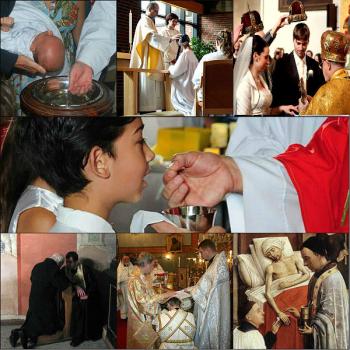Recently, there has been some controversy over Pope Francis’ desire for the Catholic Church to better deal with the pastoral needs of divorced and remarried Catholics. Some, including a few Cardinals, seem to think his actions goes against Catholic teaching, and that he would end up encouraging people living in mortal sin to receive communion. They have the false belief that being divorced and remarried automatically bars anyone from communion, that it always has been a detriment to communion, and any proposed change to allow divorced and remarried communion must therefore be heresy.
![Crowning Ceremony conferring marriage. By Zde (Own work) [CC BY-SA 4.0 (http://creativecommons.org/licenses/by-sa/4.0)], via Wikimedia Commons](https://wp-media.patheos.com/blogs/sites/637/2016/11/Greek_Orthodox_wedding_in_Tripodes_Naxos_119276-300x200.jpg)
Now, within the Catholic Church, Eastern Catholics have recently suffered some Latinizations, often imposed upon them (such as in the current Code of Canon Law), and so Eastern Catholics currently follow Western discipline in relation to divorce and remarriage (although that has not always been the case). When Eastern Catholics first reentered communion with Rome, their discipline was accepted, and they have had centuries of following their traditional practices in regards to remarriage. It was not seen as a dividing line, even as it was not seen as a dividing line in the various attempts to reunion the West and East at various union councils (such as the Council of Florence). The West did not view such practice as heretical.
Outside of the Catholic Church, the Orthodox continue their tradition of allowing remarriage. They recognize the breakup of a sacramental marriage is indeed a bad thing, a sin; but just like the eucharist, when the species are no longer recognizable means the sacramental presence is no longer there, so with marriage, the sacramental presence can be lost, and for marriage it is sin which serves as the cause of its destruction. Sin has to be recognized, and the Orthodox do that, but they do so with the recognition that as with all sin, there is the possibility of forgiveness and healing: such healing does not bring back the sacramental marriage, but it does allow a divorced couple to remarry. It is not seen as ideal, but it is allowed, and since marriage, even natural non-sacramental marriage, not only keeps sin in check but is an actual good, the realization that some people need that good is not lost on the Orthodox. This is one reason why remarriage, through a non-sacramental rite, is allowed by them.
Once again, Rome has never spoken against the Orthodox, nor has Rome treated their understanding of marriage as heretical. Rome, in her talks with the Orthodox, has accepted the Orthodox practice as permissible. This can be shown by the way Rome allows the Orthodox to receive Catholic communion.
That’s right.
The Orthodox are able to receive communion in a Catholic Church, and that includes divorced and remarried Orthodox.
This means that the Catholic Church already allows divorced and remarried Christians to communion. No one, not even those Cardinals being critical of the Pope, has stopped this practice. No one has declared the Orthodox as heretics who should therefore be denied communion. Schism between Catholics and Orthodox has made for an imperfect relationship with each other, but nonetheless, they are able to receive communion from each other (however extraordinary the situation).
The recognition that the Catholic Church already allows remarried Christians to receive her communion, and that in its history, many Eastern Catholics followed the Orthodox practice in matters of divorce and remarriage, should help explain to the Pope’s critics that the Church can allow pastoral concerns to take precedent. And this is why, even if there are questions as to how best to put such concerns into practice, the way forward is to at least recognize reality, to understand what is already allowed, and to use that as the foundation for further pastoral concerns. Moreover, this should put an end to those causing strife, that is, it should put to a halt those trying to suggest that the Pope is a heretic. The Pope, with his connections with the Orthodox and Eastern Catholics, knows better than his critics the complex history which lay outside of current Latin Rite discipline.
Stay in touch! Like A Little Bit of Nothing on Facebook:
A Little Bit of Nothing













